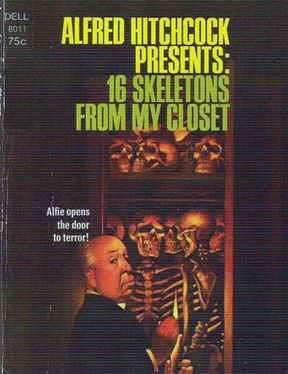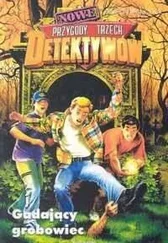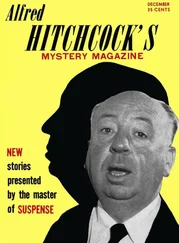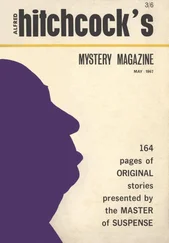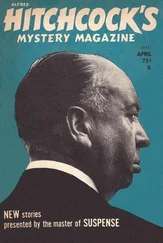"Simon."
He started.
"Phil Silvers — "
"Yes, a riot."
"You're not paying attention," Sheila chided.
"I'm sorry. I was thinking about what Mrs. Steele said. I was wondering where Polly's really gone."
"I told you, Simon, I know where she's gone."
Her laughter again, as from another room, another world, before she rose and announced that dinner was ready.
Simon sat at the head of the rectangular table with Mrs. Brevoort on his left and Mr. Brevoort on his right. Sheila lit the candles, then went into the kitchen and brought out the casserole in a large copper chafing dish. She lit the little burner in the wrought-iron frame and set the chafing dish over it. "It won't really cook this way," she explained, "but it looks nice, and it does keep it hot."
Simon looked out the window again. Dry leaves brushed against the glass. He clenched his hand under the table. He thought Sheila was talking too much. It was deep dark outside. He heard Mrs. Brevoort give a little exclamation of delight as her plate was served. He heard Mr. Brevoort say, "Curry… Anything curried… Love it, love it…" Then his own plate was set before him and he looked down at it, steaming there in the candlelight.
Mrs. Brevoort had taken a tentative taste. She said, "Mmm," and "Delicious, but what in the world is it?"
"A secret recipe," Sheila said, "though I have to admit I've never tried it before."
"A triumph," said Mr. Brevoort.
"Simon?" Sheila said.
"Oh, yes… Yes." He tasted the casserole. It was heavily seasoned, disguising another odd flavor he could not distinguish. "Not bad," he said. He glanced up and noticed that Sheila's plate was empty. "Aren't you having any?"
"I'm not hungry."
"But you never miss dinner."
"I know. But tonight I'm just not hungry."
That laughter again, the red moist lips, the bright gleaming eyes. Outside a slight wind began rustling the trees, and a child shrieked something in the darkness. He felt cold again. He wished Polly were home. He wished tonight were over and the promotion were all set so that he did not have to pretend with Sheila any longer. He could get her committed — for good — and he could sell this house he hated and take Polly with him and go to Ida.
"You're not eating, Simon."
"Yes, it's good. Very good." But he was not hungry. He had never liked strange foods, and had only insisted on this exotic dish because of the Brevoorts. He took another tentative mouthful, noticed a long blonde hair on his fork, and drew it off surreptitiously, thinking idly that it was one of Polly's of course, because Sheila's hair was a darkish brown. He was vaguely aware of the trees shaking in the rising wind. Mr. Brevoort said, "Yes, I will have seconds, please," and Mrs. Brevoort said, "You've simply got to give me the recipe. Onions and mushrooms and peppers and curry… And I presume the meat was sauteed, but what is it?" Sheila laughed secretly and he took another bite, and it was then that he found the fingernail. It was small and sharp and curved. It had caught between his teeth, and when he first examined it under the flickering light of the candle, he was not quite sure what it was. Then, when he did understand, it was only with a strange sense of detachment, until he looked up again and found Sheila smiling at him.
"Something the matter, dear?"
"No. Just something I — "
"Don't worry, dear. I know where Polly is."
"I know… I know." He placed the fingernail carefully on the side of his plate. He stared at it vacantly. "You will not get Polly," Sheila had said. "I know where she is… It's a secret recipe… And take out the garbage, but don't open the bag or you'll be sick…" Her eyes were too bright. She laughed too much, and deep down she'd always disliked his affection for Polly, and she'd never refused to eat dinner before. She had brown hair and her fingernails were long and red, and had not been cut for days. The wind sighed through the trees. And it was funny, Mrs. Steele had said. And why didn't Polly come home, and why had he been so terribly cold all evening, and why was he dizzy now, his hand trembling beyond control, his body beginning to shake, too, in a horrible spasm that would not stop?
"Chicken?" said Mrs. Brevoort.
"No, not chicken."
"Veal?" said Mr. Brevoort.
"No."
"Lamb?"
"No."
"Pork?"
"No." Sheila was still smiling. "Do you want to guess, Simon? Or did you peek? I bet you peeked when you were taking out the garbage. Simon… Simon?"
Simon screamed. He rose and screamed again and then again. He rushed to the door and screamed into the windy night. "Polly!.. Polly!" He ran back through the house and out the kitchen door, down the steps to the garbage can. He raised the lid, put out a hand, then snatched it back again and let the lid drop with a clatter. He was violently ill, leaning shuddering against the porch while the leaves whirled up around him. "Oh, God," he sobbed, "Oh, my God, my God!" He staggered back up the steps and into the living room. The Brevoorts were leaving, hurriedly, talking of getting a taxi. He hardly saw them. He was still screaming. The door closed and Sheila turned to him and said, "Now see what you've done, Simon? They don't think we have a happy home at all."
He kept on screaming. "You're crazy … Really crazy … And this time you're going away for good ," and "Oh, my God, oh, my God," as he stumbled to the phone and dialed Doctor Birnam with trembling hands. His words were nearly incoherent. "I never realized … Something terrible… Bring the ambulance… Bring a strait jacket… Oh, my God!" while he laid his head against the receiver and shuddered and sobbed hysterically and could not stop.
* * *
"Terrible," Doctor Birnam said, after the white-coated men had taken the protesting figure through the doorway. "Simply terrible."
"But why? " sobbing uncontrollably. "Why… Why?"
The doctor shrugged. "These things are hard to explain. If you'd only seen it coming — but you couldn't possibly have guessed."
"And tonight, too — of all times — of all times when tonight was so important ."
"I just don't — know." The doctor put out a reassuring hand, then moved slowly toward the door. "Of course, we'll do everything we can. A strait jacket for a while, and then treatment — I just don't know." He opened the front door and said, "Well now, how's my favorite little girl?"
"I'm fine," Polly said as she stepped inside. The doctor left and Polly said, "Susie's going to get the dickens for going to the movies without telling her mother." She looked around and said, "Where's Daddy?"
"Gone away."
"For a long time?"
"I'm afraid so."
"He said you were going away. But I'm glad it's him instead of you."
"Are you, darling?" She dried her tears. "Are you?"
Polly nodded, and said, "I'm famished."
"So am I."
They sat at the table and she served them both a large portion of the casserole, still hot over the little burner.
"It's good," Polly said. "What is it?"
"Guess."
"Chicken?"
"No, not chicken."
"Veal?"
"No."
"Then what?"
"A secret recipe," she said, and smiled fondly, faintly at her daughter.
Daddy-O
by DAVID ALEXANDER
It is generally agreed that it takes all kinds to make a world — an imperfect world, that is. This tale of mounting uncomfortableness contributes a singularly unattractive villain, a Mr. Heavenridge. Anent Mr. Heavenridge, it is my humane feeling that they also serve who smell quite badly.
* * *
Marcia had run away again. That was the short, sad history of her younger sister's life, Helen thought bitterly. Marcia always ran away. She could never face up to unpleasantness, to any reality. When something like this occurred, Marcia ran. She had many means of escape. The sleeping pill Marcia had just taken was one; alcohol, another. But mostly Marcia escaped through some queer mental process of her own, into a world of fantasy where everything was exactly as she wanted it to be. She could never accept things as they were.
Читать дальше
